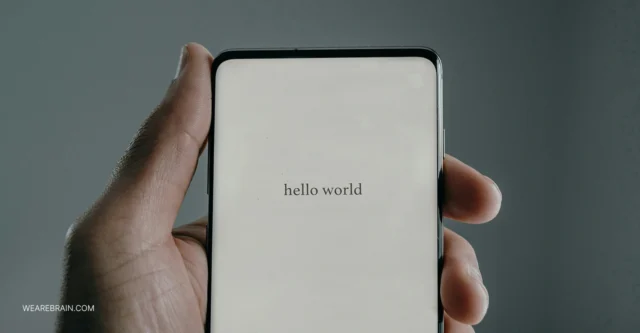
Is it possible for a web developer to shift gears and step into mobile app development?
Yes, absolutely.
Recently, together with my colleagues at WeAreBrain, I had the chance to prove it during the rebuild of the mobile applications for Thnx Tags.
Armed with my frontend background and the power of React Native and Expo, I dove into rebuilding outdated native iOS and Android apps. The result? A fully redesigned, feature-rich, and modern mobile app delivered in a short timeframe.
This experience showed how much of our frontend knowledge is transferable – from component structure and state management to API handling and design systems.
Of course, mobile comes with its own set of challenges – like navigation stacks, gestures, performance optimization, and handling platform-specific quirks – but with the right team and the right tools, the leap from web to mobile development is absolutely doable.
Transferable skills for web developers entering mobile
As a web developer transitioning to mobile app creation, I was pleased to discover many of my existing skills applied directly:
- JavaScript/TypeScript proficiency remains essential
- Component-based architecture concepts transfer perfectly
- State management patterns work similarly in mobile contexts
- API integration approaches remain largely consistent
- UI/UX fundamentals still apply, just in different contexts
This overlap makes the journey from web development to mobile app building more approachable than you might expect.
Why Expo & React Native?
There are several options out there for cross-platform mobile development, like Flutter, Tauri, or even new players like Lynx.
Each has its strengths, but when the goal is to reuse web/frontend experience, especially with React, nothing comes close to React Native for web developers looking to expand into mobile territory.
Here’s why we chose React Native + Expo:
✅ Shared codebase across iOS and Android – write once, deploy anywhere
✅ Expo’s powerful service for building, publishing, and OTA updates
✅ Hot reloading for a smooth and productive dev experience
✅ Rich ecosystem and a vibrant community
✅ Excellent documentation that lowers the learning curve
If you’re coming from a frontend background, especially React, this stack feels like a natural extension, letting you build native-feeling apps without giving up the tools and patterns you already know.
The challenges no one warns you about
So, what challenges are waiting for you if you decide to jump from web development into mobile app creation?
The good news: you can get started fast, especially with Expo Go – you’ll see your app running on a real device in minutes.
But the reality kicks in when you start dealing with real-world features like:
🔸 NFC and device-specific hardware
🔸 Image manipulation and camera integration
🔸 Barcode scanning
🔸 Advanced animations for that modern, fluid UX
🔸 Handling offline states and synchronization
🔸 Managing permissions across different operating systems
That’s when things get tricky, and the differences between web and mobile development become more apparent.
Sometimes, you’ll implement a feature in an hour…then spend two days trying to figure out why it won’t build for Android, or why push notifications just don’t show up on iOS.
You’ll dig through specific package version issues, experiment with native modules, tweak build settings – and yes, lose a bit of your energy and motivation in the process. 😅
The rewards of making the web-to-mobile transition
But the reward?
You come out with real mobile development skills and a product that feels just as good as a fully native app, and in our case, we have great results:
✨ Modern and fresh UI/UX
✨ New features integrated seamlessly
✨ Cross-platform with a single codebase
✨ Easier future maintenance
✨ Great app performance
Most importantly, you expand your skillset from being solely a web developer to becoming a more versatile mobile application developer, opening up new project possibilities.
Is the web-to-mobile developer path right for you?
If you’re considering making the transition from web to mobile development, know that the journey is challenging but rewarding. The tools available today make this transition more accessible than ever before.
The key is to leverage your existing web development knowledge while embracing mobile-specific patterns and considerations. With frameworks like React Native that bridge these worlds, web developers can successfully navigate the path to creating exceptional mobile experiences.
Whether you’re looking to expand your skillset or tackle new types of projects, the web-to-mobile developer transition offers tremendous opportunities for growth – and might just be the refreshing challenge you’re looking for.
